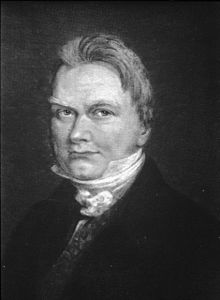J. J. Berzelius
| J. J. Berzelius | |
|---|---|

Jöns Jacob Berzelius (1779–1848)
|
|
| Born |
20 August 1779 Väversunda, Östergötland, Sweden |
| Died | 7 August 1848 (aged 68) , Sweden |
| Nationality | Sweden |
| Fields | Chemistry |
| Institutions | Karolinska Institute |
| Alma mater | Uppsala University |
| Doctoral advisor | Johann Afzelius |
| Doctoral students |
James Finlay Weir Johnston Heinrich Rose |
| Known for |
Atomic weights Chemical notation catalysis Silicon Selenium Thorium Cerium |
| Notable awards | Copley medal (1836) |
Baron Jöns Jacob Berzelius (Swedish: [jœns ˌjɑːkɔb bæɹˈseːliɵs]; 20 August 1779 – 7 August 1848), named by himself and contemporary society as Jacob Berzelius, was a Swedish chemist. Berzelius is considered, along with Robert Boyle, John Dalton, and Antoine Lavoisier, to be one of the founders of modern chemistry.
Berzelius began his career as a physician but his researches in physical chemistry were of lasting significance in the development of the subject. He is especially noted for his determination of atomic weights; his experiments led to a more complete depiction of the principles of stoichiometry, or the field of chemical combining proportions. In 1803 Berzelius demonstrated the power of an electrochemical cell to decompose chemicals into pairs of electrically opposite constituents.
Berzelius's work with atomic weights and his theory of electrochemical dualism led to his development of a modern system of chemical formula notation that could portray the composition of any compound both qualitatively (by showing its electrochemically opposing ingredients) and quantitatively (by showing the proportions in which the ingredients were united). His system abbreviated the Latin names of the elements with one or two letters and applied superscripts to designate the number of atoms of each element present in both the acidic and basic ingredients.
Berzelius himself discovered and isolated several new elements, including cerium (1803) and thorium (1828). Berzelius’s interest in mineralogy also fostered his analysis and preparation of new compounds of these and other elements. The mineral berzelianite was discovered in 1850 and named after him. He was a strict empiricist and insisted that any new theory be consistent with the sum of chemical knowledge. He developed classical analytical techniques, and investigated isomerism and catalysis, phenomena that owe their names to him. He became a member of the Royal Swedish Academy of Sciences in 1808 and served from 1818 as its principal functionary, the perpetual secretary. He is known in Sweden as "the Father of Swedish Chemistry". Berzelius Day is celebrated on 20 August in honour of him.
...
Wikipedia
